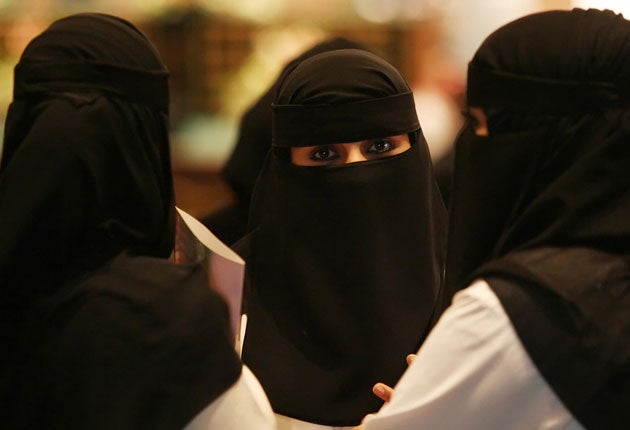
Your support helps us to tell the story
From reproductive rights to climate change to Big Tech, The Independent is on the ground when the story is developing. Whether it's investigating the financials of Elon Musk's pro-Trump PAC or producing our latest documentary, 'The A Word', which shines a light on the American women fighting for reproductive rights, we know how important it is to parse out the facts from the messaging.
At such a critical moment in US history, we need reporters on the ground. Your donation allows us to keep sending journalists to speak to both sides of the story.
The Independent is trusted by Americans across the entire political spectrum. And unlike many other quality news outlets, we choose not to lock Americans out of our reporting and analysis with paywalls. We believe quality journalism should be available to everyone, paid for by those who can afford it.
Your support makes all the difference.Saudi Arabia's King Abdullah has ruled that women will be allowed to vote and run as candidates in nationwide local elections for the first time, a critical victory for those who have long campaigned for the most basic of rights in the ultraconservative Muslim kingdom.
Yesterday's announcement marks a major symbolic achievement for Saudi women, who have stepped up their public campaigns in recent months pushing for universal suffrage, the right to drive and a lifting of the strict guardianship laws that govern almost every aspect of their lives.
But the changes come much too slowly for some – women will not be able to participate in elections this Thursday as nominations are already closed – and leave the issue of other fundamental freedoms unaddressed.
In an annual speech to his advisory council, King Abdullah said that women will be able to vote for and stand in the next municipal elections four years from now, giving them access to the only public polls in the Islamic kingdom, and would also be appointed to the next session of the influential Shura Council, the unelected body which advises the King.
"Because we refuse to marginalise women in society in all roles that comply with sharia, we have decided, after deliberation with our senior ulema [legal scholars] and others to involve women in the Shura Council as members, starting from the next term," the 86-year-old Saudi monarch said.
"Women will be able to run as candidates in the municipal election and will even have a right to vote," he added.
Apart from the Kingdom of Brunei, where neither men nor women can vote, Saudi Arabia is the last country in the world to deny women the vote, and it held its first municipal elections in 2005. King Abdullah is seen as a reformer who is largely sympathetic to women's rights, but he has been reluctant to alienate conservative religious elements and even members of his own family.
His decision will be seen by some as a reflection of his fears that the Arab Spring could reach the oil-rich kingdom, so far untouched by the dissent that has agitated the region.
Saudi women have been inspired by the leading role of some women in the Arab Spring, encouraging them to step up their efforts to achieve the basic rights long denied to them. Besides not having the vote, women are barred from driving and are unable to work, travel or even have a medical operation without the permission of a male guardian, usually the closest male relative.
"This is great news," Wajeha al-Huwaider, a Saudi women's rights activist, told Reuters. "Women's voices will finally be heard. Now it is time to remove other barriers like not allowing women to drive cars and ... not being able to function, to live a normal life, without male guardians."
The decision drew muted reaction on social-networking sites such as Facebook and Twitter. "Shura Council is still unelected, and municipal councils are powerless, but women participation is important progress," tweeted Ahmed al-Omran, a Saudi blogger. But, from other quarters, the development was met with mockery. Modigliani40 tweeted: "Saudi women can go to vote! But on foot!"
Earlier this year, a Saudi woman launched the first-ever legal challenge to the laws barring females from voting. Several women took a more confrontational approach, turning up to polling stations to try to register for local elections, but were harangued by male voters.
More high profile, though, has been the campaign to overturn the driving ban, a cause intermittently revived since a group of Saudi women prominently challenged the ban in 1991 following the Gulf War. Manal al-Sharif, a 32-year-old single mother, became a minor celebrity this year after she filmed herself driving around Al-Khobar in Eastern Province, leading to her arrest and brief detention.
... but they still can't...
Drive: Saudi Arabia is the only country where women are barred from driving. There is no written law, but fatwas from religious clerics have forbidden it and authorities do not issue licences to women.
Travel without permission: Women are unable to leave the country without the permission of a male guardian. The "guardianship" system also prevents women from doing a range of day-to-day activities, such as opening a bank account or accessing healthcare, without the permission of a male family member or husband.
Choose their own clothes: A woman's entire body, except for her hands and eyes, must be covered in public or in the presence of men who are not family members. Tradition also dictates that clothes should be dull and unadorned, but the degree to which this is followed varies between regions. The city of Jeddah allows more freedom.
Join our commenting forum
Join thought-provoking conversations, follow other Independent readers and see their replies
Comments